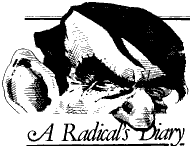
London,
England, July 28, 1999:  LIGHT
back from Miami lands at Heathrow at seven
a.m.; much help from Virgin-Atlantic's
Ken Burgess, who pushed
Tony's wheelchair around from the
plane to the car rental bus. I say I'll
commend him in a letter to his boss. Back
at Duke Street I work on court papers for
a while, then straight down to the High
Court at 1:30 p.m. LIGHT
back from Miami lands at Heathrow at seven
a.m.; much help from Virgin-Atlantic's
Ken Burgess, who pushed
Tony's wheelchair around from the
plane to the car rental bus. I say I'll
commend him in a letter to his boss. Back
at Duke Street I work on court papers for
a while, then straight down to the High
Court at 1:30 p.m.
CBS
Television has phoned during the morning,
they want to film me outside the High
Court for their upcoming Sixty Minutes
programme on the Gitta
Sereny case.
They film me carrying the bundle of files
into court; I warn them that the hearing
will last two hours at least. Up in
the judge's chambers, it rapidly becomes
plain that it will last all afternoon, as
Andrew Caldecott QC applies for an
order setting out that my discovery is
still incomplete. Master Hodgson is
initially abrasive toward me, like last
time, and I break out in beads of
perspiration. Over
the three hours' session, however, and as
he reads his way into the files, he
evidently warms toward me; and at the end
of the session, as we pack our files and
chat behind closed doors, I find I am
asking him things like is he older than
Master Trench (yes), and what does
he think of Lord Justice Woolf's
procedural reforms (...), etc. Master
Hodgson spends much of the time digressing
on history, and his expectations (false)
that I intend to refight World War Two in
this trial, and to upset established
versions of history (nearer the mark).
From his pronunciation of some of the
German texts, I suspect he knows rather
more of that language than he admits; and
Andrew Caldecott too, though the latter
defers to what he calls my bilingualism in
the languages. The
judge sets out to me at quite needless
length the distinction between Discovery
and Inspection, and more usefully explains
that the new Civil Procedure Rules are
designed to hurry actions along and to
deny litigants the opportunity to drag
their feet and protract the case.
Bit by
bit the Order sought by Sereny's lawyers
is whittled down, until less than half
remains and that by consent, so he refuses
their application that he make an order
for an immediate payment by me of the
day's costs, which they have helpfully
assessed at £10,467, and merely says
that he will order costs in the case, as
the wording now has it: what is admired in
other countries as the English
"loser-pays-all" system. I
rather like Caldecott QC: he seems a civil
and educated kind of gent -- a
knife-and-fork kind of chap, i.e. unlikely
to be seen slurping peas of the back of a
knife; J. did not like him, but that is
the rivalry that always exists between
solicitors who do the work, and barristers
who get the credit. So once again my
summons for directions, designed to get
firm dates fixed, has been bumped off the
flight; but Hodgson says grimly that now
that he is in charge and the new rules are
in place, he will ensure that there is no
footdragging. OUT
at 4:45 p.m. CBS film crew are still
patiently waiting there. The Sixty Minutes
interviewer asks a bunch of prepared
questions on Gitta Sereny. Their thrust is
clear: that this is a bitter feud that has
been played out between powerful writers
for twenty five years now. I confirm that
Sereny launched her first attack to me in
1977, but that I have turned the other
cheek, like a good Christian, until it
became impossible to do so because her
libels were designed to destroy my
career. Do I
have any good things to say about her?
"Well," I venture, "she does manage to get
inside her characters." (In some cases
rumour has it the opposite might be true).
"She managed to get inside the character
of Albert Speer rather well: that was
exactly
the Speer that I had got to
know
-- tho' perhaps a few years earlier than
she did," I purr. "In fact right after his
release from Spandau." "You
have also had some rather rotten things to
say about her," persists the CBS lady. I
murmur that their Lordships inside the
grey stone building next door would frown
if I were publicly to badmouth a defendant
in an action; but I can confirm certain
remarks which she puts to me as having
been said in the remote past. "Did
you once call her, in a letter, a
shrivelled little toad?" asks the
interviewer. (It was in a private letter
to the editor of The
Independent). "--
t*rd," I correct her; and I hope that
thereby an injustice has been
prevented. [Previous
Radical's Diary] |